Who amongst us has not had a terrible response to a situation? It may be something simple, from when you were a kid. When mommy and daddy left you to go to the bathroom. Or, it could have been your average television show, where you watch a person, who gets killed, with a knife to the throat, and you watched – every – bloody – moment. You can’t erase these things from your mind. The images play, like a broken record, or a scratch that itches, a terrible situation that replays or acts out again and again in different ways.
Trauma is the result of our nervous system being overwhelmed by experiences that are hard to process and tolerate. Our brains “processor” goes into a loop of the event(s) and gets repeated again and again. Energetically, a “pain-body” of energy is crracrea, which feeds on itself if not resolved. Scene after scene, returning to the crime, feeling numb and “hyper-aroused” (anxiety, angry, aggressive, rage, etc.) and then bouncing back to “hypo-arousal” (numbness, depression, shame, humiliation, exhaustion, etc.), from “pillar to post” as they say. Coping mechanisms may include drugs, crime, “living-on-the-edge” activities, alcohol, drugging, eating, sexing (porn), shopping, and unhealthy relationships. To escape or justify self-judgment and pain these activities can be habit-forming. As human beings, we turn to things that make us feel better when we are uncomfortable, in pain or numb. But, make no mistake, these issues all have profound impacts and it’s easy to get lost in the deep, painful experiences, or try to rebound from incredible lows, with incredible highs.
 What’s Mindfulness got to do with Trauma?
What’s Mindfulness got to do with Trauma?
When left un-checked, trauma, PTSD, and addiction can all unfold without our awareness, recognition or choice. Mindfulness is a tool used to develop self-awareness and sensitivity. Mindfulness is the awareness of the present moment – right now. For example, right now – as you read this – is there anything wrong? Are you okay? You are reading this, yes? Is your body or emotional well-being okay, yes? If you answered yes to those questions, you’ve practiced mindfulness. It involves self-acceptance and our willingness to experience feelings and thoughts without judging at the moment. Research shows that mindfulness can reduce anxiety, depressive symptoms and regulates emotions. Mindfulness helps us to be patient, observe and uncover our blind spots so that we can recognize and choose emotional strength.
Research on Mindfulness-Based Relapse Prevention (MBRP) and Mindfulness-Oriented Recovery Enhancement (MORE) provides hope for people going through trauma, PTSD and addiction. An MBRP program is an eight-week program that reduces relapse susceptibility and MORE focuses on developing meaning and fulfillment in life. MORE encourages people to embrace the pains and pleasures of life without avoiding the challenges. MBRP includes a meditation and practice with various behavioral and cognitive skills. For instance, we notice unpleasant thoughts as they arise. We write them down and familiarize ourselves with them. We learn how to deal with discomfort, through “urge surfing”. With MORE we focus on three therapeutic processes; 1. Mindfulness practice – 2. Reappraisal which is aimed at fostering adaptive coping in stressful situations – 3. Savoring all the rewarding experiences (for example, enjoying a special bond with a loved one)
MBRP or MORE help us to build our awareness of situations, thoughts, and feelings. They a buffer to build emotional literacy, to stop, take a moment, observe and proceed differently, improving our lives in the following ways:
- Engagement- Fear, uncertainty, and doubt can block engagement. Mindfulness requires that we watch, listen, observe, practice self-acceptance and kindness
- Compliance– Mindfulness requires that we look, listen and learn, watch thoughts, feelings, develop perspective, self-compassion, and kindness
- Preparation- We simply observe thoughts, feelings, and reactions as they come up, we can stop, journal and “note” when unpleasant emotions arise and let them go
Mindfulness has a significant impact on connections in our brain that are essential for mental self-awareness, self-efficacy, self-actualization and emotional control. For people going through trauma, PTSD and addiction, mindfulness is not only about meditation, it’s also about learning more about themselves and having flexibility, choice, and freedom. Contact me for more information.
With kindness,
![]()


 What’s Mindfulness got to do with Trauma?
What’s Mindfulness got to do with Trauma?